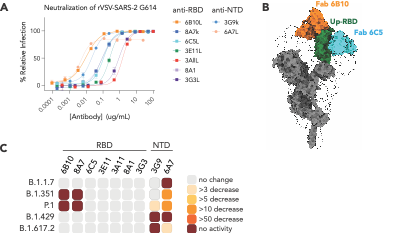ANTI-SARS-COV-2 Spike (S) Antibodies
Investigator(s):
 Erica Ollmann Saphire, Ph.D.
La Jolla Institute for Immunology
Erica Ollmann Saphire, Ph.D.
La Jolla Institute for Immunology
Categories:
Diagnostics
Infectious Disease
Virology
Recently defined SARS-CoV-2 Spike antibodies show promise for future use in saliva-based diagnostics and other research tools
Researchers have found that human antibodies can neutralize SARS-CoV-2 by targeting key sites on the virus’ Spike protein. These sites are the receptor binding domain (RBD) and the N-terminal domain (NTD). These antibodies have therapeutic and diagnostic value. The antibodies are also valuable tools for investigating vulnerabilities in the SARS-CoV-2 Spike protein.
Instructor Dr. Kate Hastie of the Saphire Lab at La Jolla Institute for Immunology, along with collaborators, has recently isolated and sequenced 68 unique human memory B-cells that produce antibodies targeting the Spike protein of SARS-CoV-2 (SARS2-S). These antibodies may be used for post-exposure therapeutics, in saliva-based diagnostic tests or as basic research tools. Furthermore, the researchers have identified highly potent anti-RBD and anti-NTD antibodies, many of which remain effective against major variants of concern.
Dr. Hastie and her team have characterized the antibodies for binding, neutralization (Fig 1A), structure by cryoEM or X-ray crystallogrpahy (Fig. 1B) , and cross reactivity with other coronaviruses and variants of SARS-CoV2 (Fig. 1C). Some have picomolar affinity and/or are broadly reactive.

Figure 1. Neutralization and variant resistance of select anti-SARS-2 Spike antibodies. (A) Neutralization of SARS-2/G614 pseudovirions. (B) Crystal structures of Fabs 6B10 and 6C5 bound to the SARS-2 RBD are shown docked into a surface representation of the SARS-2 spike protein. (C) Fold-change in IC50 values for nAbs against major variants of concern.